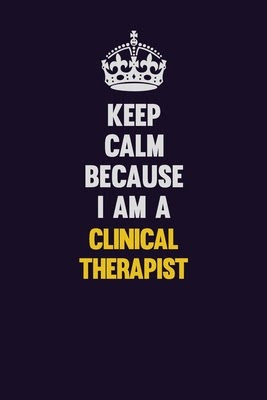Clinical therapists help people overcome a range of mental health and emotional issues that can range from anxiety and depression to suicidal thoughts.
Clinical therapists have job descriptions similar to clinical psychologists, although there are key differences. To practice as a clinical therapist, you’ll need to earn a master’s degree. Clinical psychologists hold a Ph.D. in the field and are trained to treat individuals with chronic mental illness such as schizophrenia. Clinical psychologists are also legally allowed to prescribe medications, whereas a therapist cannot.

One of the most important traits a successful clinical therapist can possess is tolerance for many different lifestyles. You are going to encounter people whose lives may be very different from yours. Mental illness can affect all walks of life.
The challenges of working with people facing severe problems are offset by the tremendous professional satisfaction of helping them get better as they overcome life’s challenges and learn coping mechanisms with your guidance. Over time, as you build your practice and gain experience, you can expect to earn an above-average salary. Six figures a year is not uncommon for therapists in private practice.
But first, you’ll need to train, become certified and receive your state license to practice. We’ll go through the process step by step.
In this article you’ll learn:
- How Much Can You Make
- Training and Certifications
- Professional Groups to Join
- Career Options for Clinical Therapists
- Finding Clients
- Helpful Tips for New Clinical Therapists
How Much Can You Make?
The average salary for a self-employed clinical therapist is currently $150,000 per year. Those working for public or private health facilities make about $52,000 per year and may be just starting out in the profession.
The U.S. Bureau of Labor Statistics estimates there will be a 29 percent growth in demand over the next two years for clinical therapists with a master’s degree in counseling. In practical terms, that means employment prospects are solid.
Training and Certifications
In order to get licensed, you need to be sure that the clinic you choose for training is approved by the American Counseling Association. This is the organization states rely upon for setting professional standards that must be met to award a counselor’s license to practice. Check the specific licensing requirements for your state here.
Strict licensing rules are in place to protect both yourself and clients from potential harm. Without strong training and licensing requirements, a counselor might begin a practice and be unable to recognize the signs of a patient at high risk for suicide, for example.

Clinical therapy programs teach students about counseling theories and techniques, ethical and legal matters, working with different individuals across all strata of society, and evaluating and diagnosing clients to prepare a proper plan of treatment.
A master’s degree will take 1-3 years to complete. A Ph.D. can take from 5-8 years to finish. Many doctoral candidates work full-time while pursuing their studies, which is why it may take longer to earn a Ph.D.
The National Board for Certified Counselors is the main accrediting body for certifying clinical therapists.
Requirements include a master’s degree with coursework in these areas:
- Human Growth and Development Theories in Counseling
- Social and Cultural Foundations in Counseling
- Helping Relationships in Counseling
- Group Counseling Theories and Processes
- Career Counseling and Lifestyle Development
- Assessment in Counseling
- Research and Program Evaluation
- Professional Orientation to Counseling
- Counseling Field Experience

Additional requirements include 3,000 hours of work experience within a 24-month period and passing an examination administered by the NBCC. You can review the exam content outline here. There’s a $375 fee that covers board registration and the exam.
Professional Groups to Join
The National Board for Certified Counselors is the group to join as a certified clinical therapist. The annual fee is $250.
Benefits of maintaining your certification are abundant:
- Use of the board’s logo and credential mark on your marketing materials
- Discounts on liability insurance.
- Publications, including a peer-reviewed journal and the NBCC Visions newsletter.
- ProCounselor, NBCC’s online portal where you can track continuing education.
- Inclusion in NBCC’s Counselor Find Directory, which helps potential clients locate counselors who maintain their board certification.
Career Options
Public health departments and private therapy facilities hire clinical therapists. The advantage of being a salaried employee, especially when you’re starting out, is there is little to no overhead. You don’t have to pay for office space, assistants to help with record keeping (unless you’re willing to do it yourself), utilities, furniture and everything else that comes with running your own business. As an employee, your liability insurance may also be covered by your employer.
Clinical therapists can also find opportunities in the local social services department, veteran’s affairs, schools and child services. Non-profit organizations, hospitals and major corporations also hire clinical therapists.

Use your membership in professional groups to connect with other clinical therapists and ask about job openings in their area. Keep in mind that if you move to another state you’ll need to be licensed as a clinical therapist by that state in order to practice.
Finding Clients
Congratulations! You’ve launched a private practice. Now it’s time to find clients and help them. Alert professionals in the community that you are available for referrals. Doctors and clergy who are aware of your private practice and know you personally are much more likely to recommend your services for new clients.

See Chapter 1 through 4 for more information on how to attract clients.
Helpful Hints for New Clinical Therapists:
Pursuing a career as a clinical therapist is a serious decision that involves careful consideration to be sure the profession is right for you. Career Profiles outlined a list of 5 advantages and 5 disadvantages to work as a clinical therapist:
Advantages
Helping people overcome their challenges is rewarding
Every day you’ll be working to help other people improve the quality of their lives. That’s a gratifying mission.
Flexible work schedules.
If you’re running your own practice, you set your work hours. Come and go as you please. Take vacations when you want to. Spend more time with family and friends.
High earning potential.
As noted by the U.S. Bureau of Labor Statistics, annual salaries of $100,000 or more are not uncommon for therapists in private practice. How much you make is up to you.

Self-employment is great.
You have an entrepreneurial spirit. Many clinical therapists get into the profession with the ultimate goal of establishing a private practice. More than a third of mental health professionals are self-employed, according to the bureau of labor statistics.
Work with new people every day.
You’ll meet a rich variety of individuals, each with unique challenges. No day is the same when you’re a clinical therapist.
Disadvantages
Clients can be stressful and draining.
Helping people overcome and manage their mental and emotional struggles can be both the greatest satisfaction and biggest challenge of being a clinical therapist. You will hear people discuss their worst hardships and most profound struggles. It can take a toll. Successful therapists quickly learn to separate their work life from personal life and practice stress management techniques.
While flexible, your schedule can also be erratic.
If you are on call, realize that client issues are likely going to come up at inconvenient times for you, personally.
Setting up your own practice.
You’ll need to find an office and fill it with furniture and equipment, stay current on your liability insurance, pay business taxes, and set up an online booking & record-keeping system.
Billing issues.
You’ll need a way to process and collect fees from clients and their insurance companies, manage paperwork and, most likely, having to refer some clients to a collection agency when they don’t pay.
Constant marketing to find new clients.
A business needs clients and yours will be no different. Plan for a marketing budget. Set up and maintain a website. Networking is one of the most effective ways to find new clients. Build relationships with other professionals who can refer clients to your practice. You might consider offering the occasional free seminar or leading a support-group meeting to build your client base.





